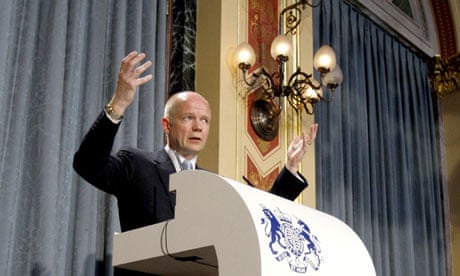The French have an expression for it: Il a manqué une belle occasion de se taire – "He (or, in this case, she) missed a good opportunity of staying silent. The saying was brought to mind by the affair of the British ambassador's blog, in which Frances Guy, our envoy in Beirut, commented on the death of the Lebanese religious leader, the Grand Ayatollah Mohammed Fadlallah.
Brian Whitaker has already covered the facts, and it is enough for my purpose to say that the ayatollah was an extremely controversial figure, very much loved and very much hated. An Israeli spokesman complained about the ambassador's remarks, the Foreign Office said that the opinions expressed by the ambassador were personal, and the blogpost was removed as it did not "fully represent" British policy. No winners in that round.
Melanie Phillips, on the Spectator's website, looked at some other blogs and found that the British ambassador in Jordan had expressed some views on Israel and Gaza which she describes as "vicious" (and which I would describe as not fully representing British policy). Phillips misrepresents them of course, leaving out the references to endorsement by David Cameron and William Hague of some of the views she objects to, and she ends up demanding that Hague should repudiate them.
I heard Geoffrey Boycott once say that if you find yourself doing something which annoys the Australians, you should do more of it. I feel much the same about Melanie Phillips. But there is a real problem here. Why do diplomats (and Whitaker's article quotes some examples from Americans as well as the British) feel the need to let it all hang out?
The reason is simple. The Miliband regime in the Foreign Office, obsessed with "process", "image", and to be blunt anything trendy, encouraged the idea that running a blog was a good career move. And, of course, a blog of this nature has to be a little bit spicy. Who wants to read the ambassador in South Korea, after attending the great jamboree of ambassadors summoned to London to listen to William Hague, opining that "to hear what the new coalition government expects of the diplomatic service was both helpful and fascinating"?
If he had said it was neither helpful nor fascinating he might have encouraged me to read further. Not much better is the account by the ambassador in Washington of his bet with the American ambassador in London on – wait for it – the outcome of the football match between England and the USA at the World Cup.
Old-fashioned diplomacy was too uptight for the modern age. My wife probably broke new ground, when we faced what was called a siege in Tripoli where I was ambassador in 1984, by talking most days live to the world's media. I thought, and think, she did a good job by adding a human dimension to a very difficult political entanglement.
So why not go all the way with blogs, Twitter, Facebook and no doubt umpteen other forms of social media? Before answering that, we need to consider what ambassadors are for. They are not super-journalists, or super-agony-aunts. Their job is to advise their governments on policy, for which deep understanding of the country in which they work is required, to carry out policy and on occasion to advocate and promote it publicly; and to provide a discreet and reliable channel of communication between governments.
Diplomats are laughed at for their "on the one hand, on the other hand" approach, but the problems they deal with are almost by definition controversial and many-sided. Sometimes they have to act quickly, but where possible it is better to think long and hard, and if necessary consult the ministry. As everyone knows who has used them, blogs and email are not conducive to that way of working.
The Foreign Office's own blog claims that "Our diplomats aren't using social media because it's cool, or because they think it will change the nature of diplomacy. They're using it because it helps them to do things that they couldn't already do."
To do them justice, they publish a comment, apparently from a member of the public, which contests that – naturally using intemperate language which as a former diplomat I deplore:
"I think the increasing use of social media at the British taxpayers' expense actually proves arrogant civil servants are not doing the jobs they are paid to do. [The FCO blog] claims that the 45 FCO civil servants currently squandering the taxpayers, money [sic] to bore anyone with the time to waste reading about their sad lives do so because it makes them more effective in their jobs. This is completely ridiculous."
Modern media, like old-fashioned media, can of course be used effectively, and that is part of an ambassador's skill. I think Frances Guy blogging on the subject of a green Queen's birthday party (that's a green birthday party, not a green Queen) got across a few points highlighting the Foreign Office and the Queen's green credentials, possibly as effectively as writing an article in a local newspaper.
But it's a pretty miserable benefit compared with the risks. Leaving aside the trivia, the issues with which ambassadors have to deal are better dealt with penseroso rather than allegro. Blogs by ambassadors were bound to end in tears. Let's hope William Hague will blow the whistle. There is a good Yorkshire saying: Hear all, see all, say now't.
